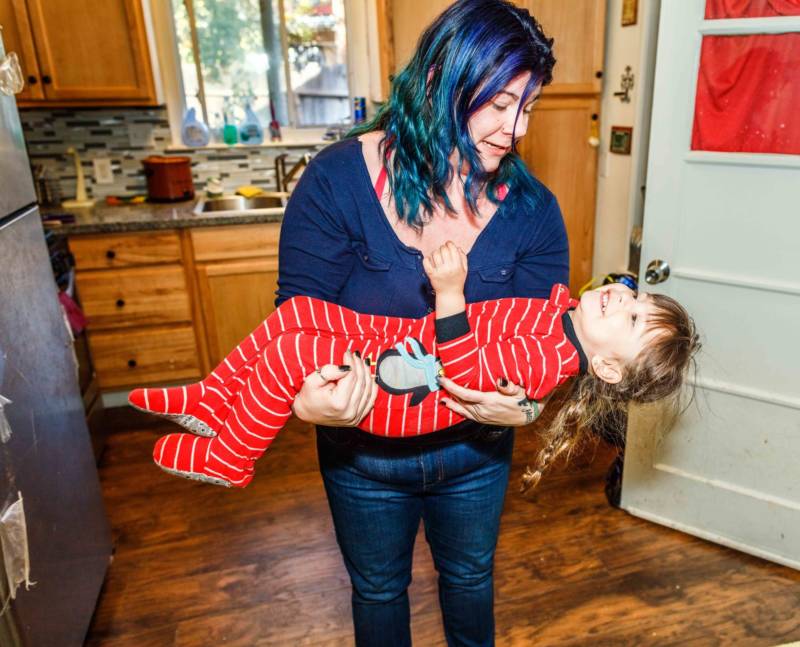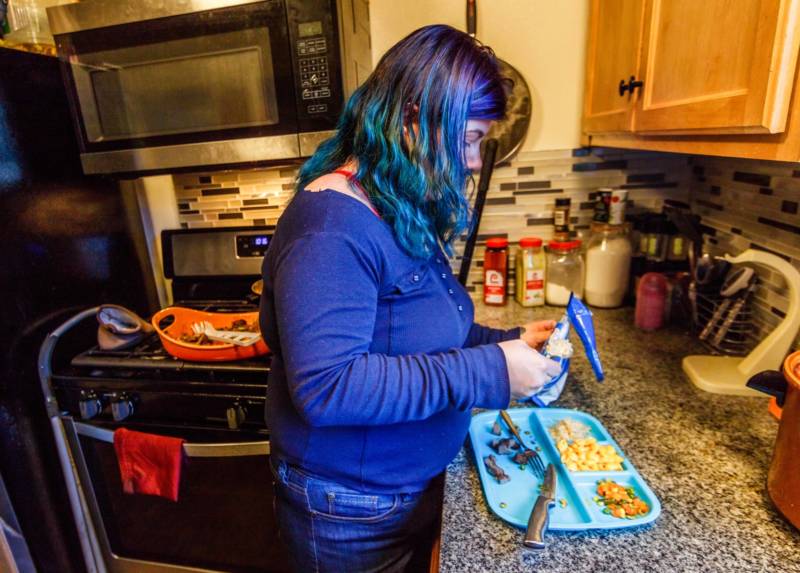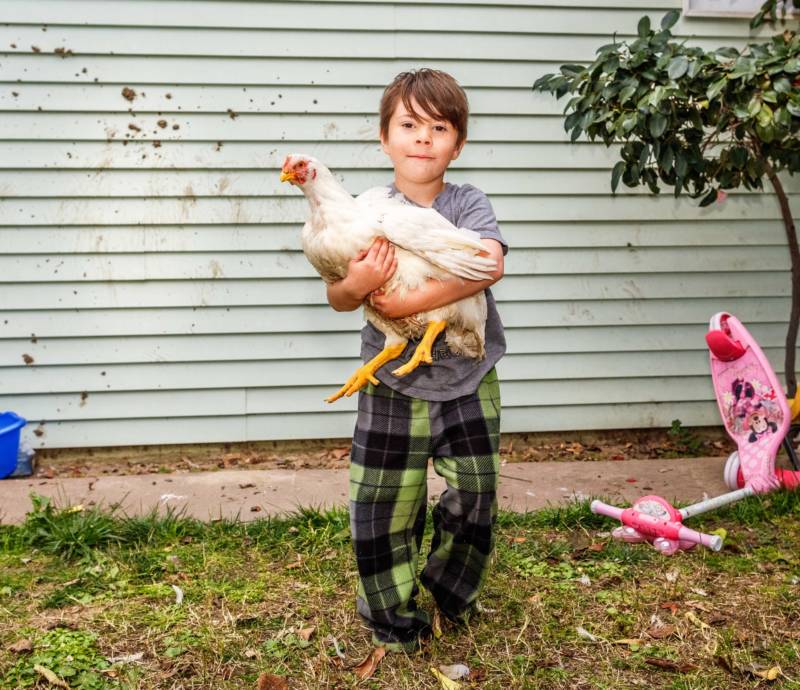In a community center in a low-income area of Merced, Monica Adrian of the county education office and a few teachers played games and held story time for parents and children.
Without Affordable Child Care, Escaping Poverty Is Tough

As they sang “The Wheels on the Bus,” they showed parents how to engage children beyond singing. “What color is the bus?” asked one teacher. “Yellow,” called out the chorus of kids. “And show me your hands, what do the tires do?” “They go round and round,” the children replied.
Instantly, the kids made giant circles with their arms. Their faces shone with excitement as they looked around at peers and their parents.
The teachers were trying to model brain-building games and activities for parents since many of them are stuck at home with young children due to the drastic shortage of child care options for low-income families in the region. The playgroup is a gap filler of sorts, a once-a-week outing for children who cannot get a seat in preschool. Merced County in the Central Valley uses federal and state dollars to provide infant, toddler and preschool care, but the majority of children still miss out.
Lack of access to quality child care is felt hard in Merced County, where early childhood poverty is particularly acute. In the county, 43 percent of all children under the age of 3 — or nearly 4,800 youth — are impoverished, according to Kidsdata. Statewide, 285,000 families with children under 5 live in poverty, according to data from the Population Reference Bureau and Kidsdata that’s based on U.S. Census statistics for 2017.

Merced County, however, is booming: It is home to the newest UC school, it has experienced the top personal income growth of any region in the country over the last five years, and manufacturing is making a comeback, resulting in new jobs. What these economic indicators leave out is children like the ones attending the county-run playgroup. Merced is a place where prosperity sits alongside entrenched poverty.
So officials like Adrian, of the Merced County Office of Education, are doing their best with limited resources. Adrian wants parents to know how easy it is to stimulate and engage their little ones and give them critical brain development skills.
“We want to make sure that parents are getting support and education, so that they can be providing the same kinds of support and early experiences [as a preschool],” she said.

Limited Spots in Government-Subsidized Child Care
There are limited spots in government-subsidized child care programs in the county. In 2017, government-licensed child care slots were available for only 19 percent of children with working parents in the area.
Alorra Allison, 3, and her sister, Alilith, 4, are on waiting lists for the highly coveted spots. “I’m hoping she’ll [Alorra] be able to get into a Head Start [program] next year,” said her mother, Bobbie Allison.
For Allison, a single mother raising four kids, solving the child care piece of her puzzle could dramatically alter her chances of finding better-paying work. Right now, the family lives in Atwater, a 30-minute drive from Merced in the Central Valley, because that’s where they can find an affordable rental — and a landlord who will accept their Section 8 housing voucher — amid the state’s housing crisis. But the child care is in Merced, as is Allison’s occasional work at 7-Eleven.
“It’s so stressful as a parent, any parent, regardless of your economic situation, to balance child care and work,” said Adrian.

Bobbie Allison feels lucky to have found a house with a yard in Atwater. And while they don’t have much else, her children have a trampoline and some chickens in the yard to provide some entertainment.
But what they don’t always have is water and electricity. Those utility bills add up and no welfare program helps to cover them.
“I’ve had to borrow money from family and friends about three times since we moved here to pay for [utilities] or to turn it back on,” Allison said.
Allison can’t afford to buy any of her kids’ school photos, nor a new pair of shoes for 6-year-old Aden, who runs everywhere and wears out shoes constantly. Her children don’t do extracurricular activities since there is no money for dance classes or gymnastics. Allison doesn’t own a computer and can’t afford internet service, so when she applies for jobs she relies on the data plan that comes with her cellphone.
But a computer, dance classes and new shoes are just nice frills. What Allison wants most is a stable job and quality child care for her two youngest children, both of whom are “ready for it,” she said. “They count, they (say) their colors, they know their ABCs.”

‘Mom Could Use a Break Every Now and Again’
The reality of being a single mom, holding down a job and looking after four kids with limited child care can be overwhelming.
“Mom could use a break every now and again,” Allison told her kids with a chuckle.
Parents do need a break: Stress builds up and even a baby will absorb it, said David Lockridge, an expert in childhood trauma.
“The nervous system is either set up to be soothed and to be calm or it is set up to be constantly on fight, flight or freeze,” said Lockridge, whose work is based on a major study done in the mid-1990s by the Centers for Disease Control and Prevention and Kaiser Permanente.

The findings showed that childhood traumas lead to long-term and lingering bad health outcomes later in life. Lockridge’s organization in Merced, ACE Overcomers, works to educate people about childhood trauma.
“If that poverty affects the stress level of the parents, that’s going to be felt by the children,” he said. “People are actually wearing out years earlier because their homeostasis, their thermometer, was ramped up too high because of early childhood adversity.”
It might seem that babies and toddlers are too young and won’t remember their early impoverished years, but the impacts get stored in the body, Lockridge said. “Whether or not a child is cognitively aware of what is going on, their body keeps score.”
Bobbie Allison said she doesn’t feel good about the life that she is providing for her children, but she doesn’t know what more she can do. She hopes to figure out a job with Foster Farms in the area, get her children into Head Start, and begin to get ahead.
Deepa Fernandes is an Early Childhood reporting fellow at Pacific Oaks College. The fellowship is funded in part by First 5 LA.
